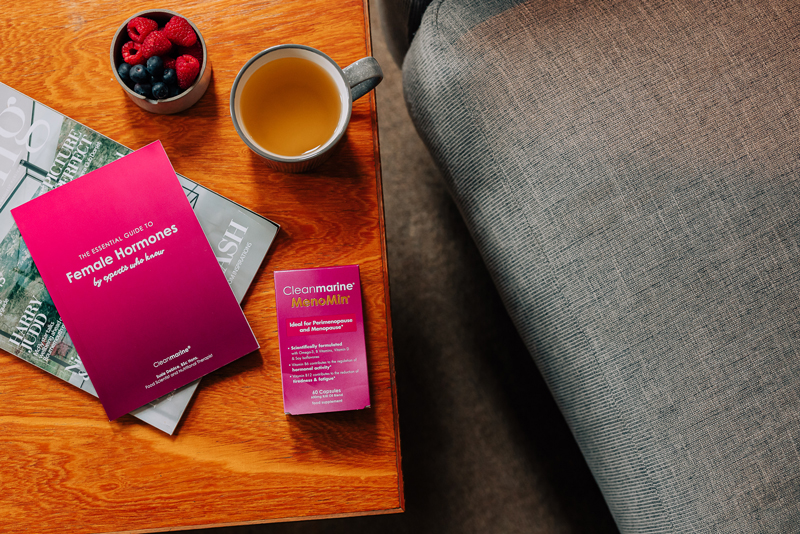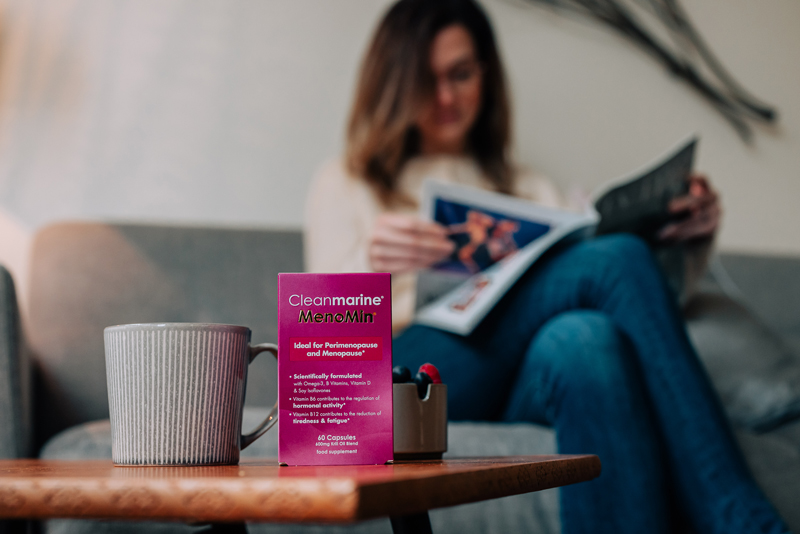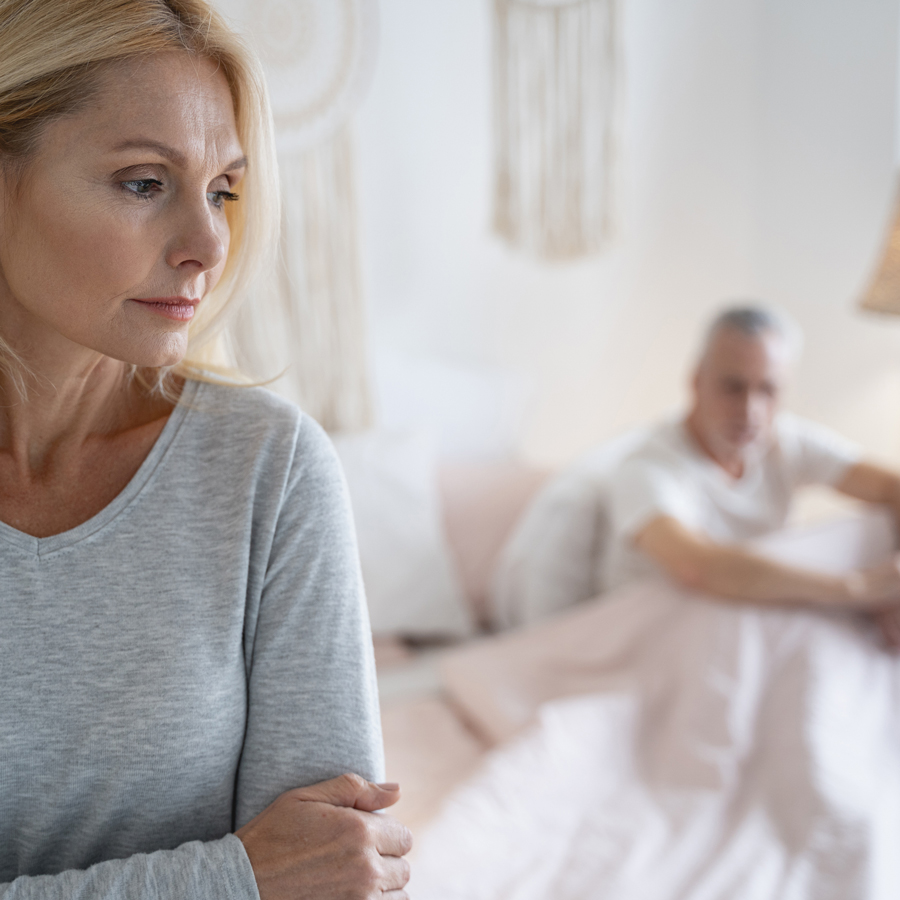IN PARTNERSHIP WITH CLEANMARINE
Loss of libido in menopause can be physically and emotionally upsetting. Openness and understanding is key …
We are inclined to forget, given how much menopause is now talked about, that only a few short years ago, it wasn’t part of the national conversation – or many conversations at all. Menopause health advocate Lorraine Keane began to experience perimenopause in her late 30s, and by being honest and open about her symptoms, prised the lid off this sealed subject. Along with endocrinologist Dr Mary Ryan, Keane has been helping women understand what happens to our bodies around perimenopause and menopause, and how to meet those challenges. And one of those challenges is loss of libido.
“A British Menopause Society Survey,” says Dr Mary Ryan, “found over half (51 per cent) of women said that the menopause had affected their sex lives, with around 40 per cent saying that they just didn’t feel as sexy since experiencing the menopause*. There are many factors that may contribute to loss of interest in sex or low libido in perimenopause and menopause. The important thing is to recognise that these changes are due to our hormones, not a lack of interest in our partner.”
Besides being a great way to raise your heart rate, sex helps keep your oestrogen and testosterone levels in balance. A healthy sex life has been shown to lower blood pressure, support the immune system, improve sleep, self-esteem, and mood. So, there are many reasons to keep your sex life alive!
Changes in our hormones in perimenopause can lower mood and increase anxiety levels in many women, which has a knock-on effect on self-esteem, relationships, and sex drive. The first step is to discuss how you are feeling with your partner and doctor where necessary.
“Perimenopause reduces estrogen levels,” says Dr Ryan, “as a result the mucous membranes in the vagina can become dryer, which makes having sex uncomfortable and a good lubricant necessary. Low energy and tiredness at this time of life can also mean many women are simply exhausted and want to prioritise sleep. This does not mean that women cannot enjoy a sex life in perimenopause and menopause. Speak openly about this with your partner, explain the changes you are experiencing and find a way to reclaim your sex life which is highly beneficial for health, and for intimacy and stress reduction in couples.”

Dr Mary Ryan and Lorraine Keane.
Keane was always open about all the symptoms of menopause, including those around sex and libido: “Long gone are the days when sex was considered something only to enjoyed by men, with women grinning and bearing. Our sexuality is a huge part of who we are and loss of a libido is a big issue around menopause. I have been talking about this for years. Does it embarrass me? Not at all. I’m lucky I grew up in a very open household where no subject was off limits, and I like to think that myself and my husband are creating the same atmosphere for our two girls, where PMS and menopause are met with kindness and understanding. I have to credit my husband with being very enlightened in this area, possibly because I have always been so open with him.”
Women do talk about menopause symptoms now – headaches, hot flashes, aching joints, but about libido, less so. Lorraine is adamant this is the next conversation we need to have around menopause. “The fatigue that menopause can bring is probably the biggest factor in loss of libido, even before you get to vaginal dryness which can make sex painful, debilitating headaches, and the unpredictability of periods, which can arrive unexpectedly, or last for several days or weeks.”
These are not “excuses” not to make love but real issues that impact marriages and upset both men and women. Open communication with your sexual partner is the best possible way to avoid misunderstandings, says Keane, so that no-one is left feeling rejected or upset. If your sex life slows down – or disappears – it can cause terrible upset to both partners. Your partner may feel rejected, and you may feel you’re misunderstood, or even failing somehow. These feelings can escalate, as your sex life decreases. There is no sense in adding emotional challenges to very real physical ones – and that’s why communication is key.

When it comes to the physical symptoms, Keane has good advice. “I take the Cleanmarine MenoMin supplement, and I swim in the sea, walk with the dogs, and stay active. I look after myself, and I don’t feel guilty about taking a nap in the afternoon, when that menopause fatigue sets in.”
“Us women are a little bit conditioned to feel guilty about putting ourselves first. Menopause fatigue can be tough. You can experience disturbed sleep. Energy levels go up and down. You can feel shattered, burned out, stressed and irritable. You can have a terrible headache. No sense in being a martyr. Reducing the fatigue associated with menopause will help, which means you’re more likely to feel in the mood for sex.”
“I look after my health and my hormones, and I know MenoMin, with its minerals and vitamins, and its Omegas, keep me supple, maintain my energy levels and also my cognitive health. It’s €29.99 a month but it’s worth it – I’m worth it. I know that biotin is helping my hair, skin and nails; that isoflavones are helping regulate my hormones and give me an oestrogen boost. Minerals help with bone density and muscle mass. And I know when I stop taking MenoMin, my energy levels go down and I don’t sleep as well.”
Having an open attitude to the challenges of menopause with your partner makes sharing these important facts and supporting each other easier. Things are changing and men can play a really useful role. “Explain the situation to your partner and they will understand that it’s really not them that’s the issue, it’s the menopause! It’s difficult for men to understand what’s going on if you don’t tell them! Involve your partner: this will actually bring you closer.”

Getting away can be a good idea, says Keane. Away from the stresses and strains of home, work, money, kids, you can take a little more time to confide in each other and dispel any doubts about why your sex life has gone downhill. “You may not have sex, but you can get that intimacy back.”
If you are experiencing difficulties, advises Keane, get help from your GP, and if he or she is not knowledgeable about menopause – and some are just not interested – get expert hep from a menopause clinic or specialist.
“The free Cleanmarine booklet, The Essential Guide to Female Hormones, is my bible and available in all pharmacies and health stores. I keep a box of them in the car to give out to any woman I meet who might be suffering. If you prefer not to have a conversation with your partner about loss of libido, give them a copy. Download for free on www.cleanmarine.ie.”
“We really don’t have to suffer in silence anymore,” says Keane. Open and honest communication, and lifestyle changes (take out some treatment please) whether you go the natural route, or not, will improve how you feel, and your sex life. And it might just bring you and your partner closer together.”
Keane also recommends It’s Probably Your Hormones by Dr Mary Ryan, All You Need to Know About Menopause by Catherine O’Keefe, Wise by Elaine Harris, Wise Up – Wisdom, Power and the Older Woman by Barbara Scully and The Menopause Kitchen by Rachel Graham. “These are all fabulous books for this natural life stage.”
Cleanmarine MenoMin, €29.99; www.cleanmarine.ie.
*The British Menopause Society: Data on file. British Menopause Society online survey in the UK conducted by Edelman Intelligence on behalf of The British Menopause Society, 2017.











